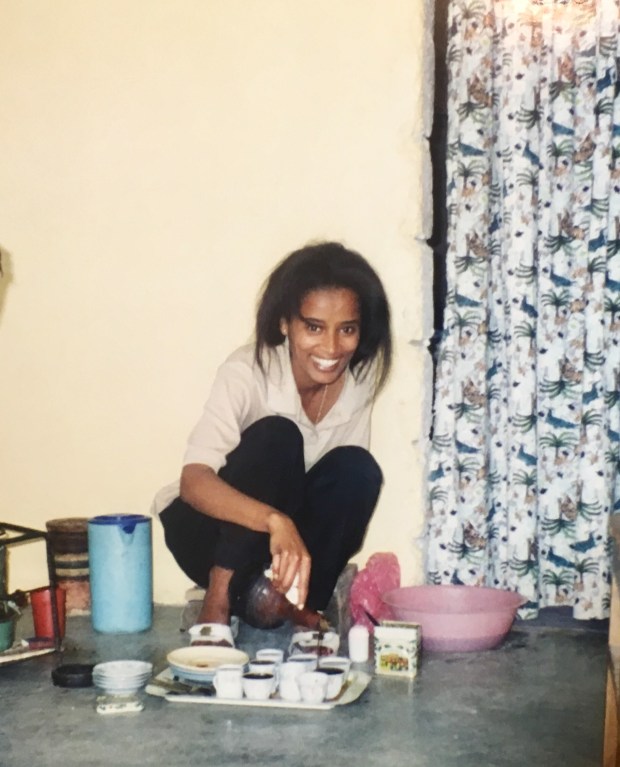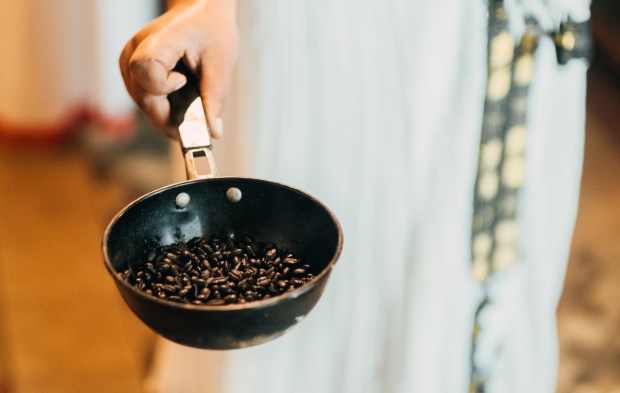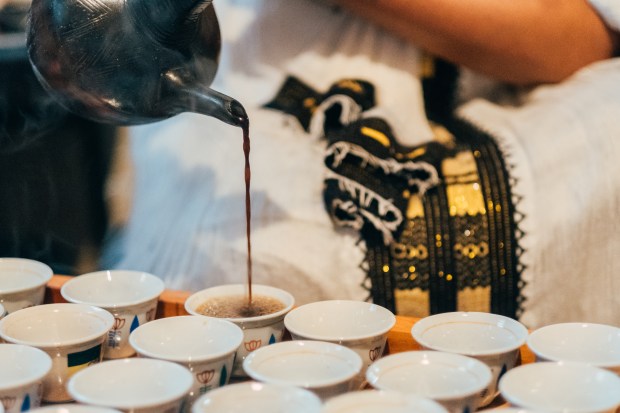In a recent deep clean of our lovely but very Brooklyn-size apartment, my roommate stumbled upon a curious artifact. Nestled amid some paperwork was a report I had written on Ethiopia in the fifth grade. A few months earlier we brought back the document—its clear plastic binding holding together a 10-year-old’s enthusiastic scrawls—from my mother’s apartment in Virginia. Initially amused by its contents, we eventually forgot about the project.
But when the report resurfaced, I revisited the text. Replete with optimistic nationalism, I had written that I would love Ethiopia “more every day until I die,” a sentiment that’s funny coming from a child and yet prescient, even as my knowledge of my parents’ native country has expanded to include elements less savory than those I excavated for the report.
What surprised me on this most recent read was a line tucked into the section on Ethiopia’s political features, just after a description of Addis Ababa, the capital city: “Kefa is a wonderful region for growing coffee,” I wrote. “This is where the famous, delicious (I’m not supposed to have tasted it!) Ethiopian coffee is grown and harvested.”

Brandishing a decidedly Ethiopian flair for the dramatic, I had rendered the guilty admission—that at such a young age I had already tasted my country’s caffeine-heavy main export—in minuscule text. My written equivalent of a whisper conveyed the excitement I’ve nursed ever since.
For Ethiopian and Eritrean people, coffee is not just a caffeinated drink. Buna, as the ritual is called in Amharic (or boon, in Eritrea’s official Tigrinya) is a fixture of daily life. It’s a cultural lifeline, a reminder that some things are uniquely ours, some customs are worth the time it takes to complete them properly.
I grew up in Southern California, only returning to the country of my parents’ birth once every several years. But no matter which side of the Atlantic I found myself on, I derived immeasurable joy from watching my grandmother, aunts, and cousins painstakingly prepare the drink, always after meals or alongside a savory snack. To prepare coffee in an Ethiopian household the right way, which is to say the traditional way, is no simple endeavor.

First, she—it is always a woman—spreads a small grass covering over the living room or kitchen floor, then places a small table atop, where she lays out the traditional cups. Known as finjal or cini, they are often decorated with images of national flags, lions, or Biblical scenes. Next, sitting on a small stool, she washes the beans and roasts them over medium heat in a small pan, tossing the pan gently to rotate the beans. The beans are always from back home. (If they’re not, why bother?) When they are nearly ready, she walks the pan to each guest, allowing them to smell the freshly roasted coffee; the scent lingers long after the coffee has been poured.
A younger woman might help with the process, grinding the beans with a mortar and pestle while they are still warm, then mixing the grounds with water in a jebena—a clay coffee pot—and placing the pot on the fire. Just before the mix begins to boil, she pours it carefully into the guests’ cups, to be served alongside popcorn or sweet ambasha.
“Buna is is very much something handed down from mothers to daughters,” says Salimah Mohamed, a New York–based medical student whose father is Ethiopian, in a video produced by the podcast See Something Say Something. Mohamed, whose mother is Pakistani, says she feels she missed out on an important ritual.

In the video Kedega Sage, an Ethiopia native and head chef of Brooklyn’s Bunna Cafe, teaches Mohamed to brew Ethiopian coffee. For Sage the ceremony is deeply rooted in family ties among women. “My mom is not alive,” she adds. “So every time I do coffee ceremony, it kind of reminds me of her.”
As a precocious fifth grader, I didn’t fully understand or appreciate how important coffee is to Ethiopians and the diaspora. All I knew was how much my aunties loved preparing the drink and sipping it with friends and family. Thousands of miles away from the country they called home, they held onto a small cup and transported themselves—and me—back to Addis Ababa, to Adwa, to Kaffa. Even then I knew the bitterness of the grounds was tempered by a sense of sisterhood, and preparing it for friends and family is an act of love. Years later I am ready to learn the ceremony myself and forge a new love of buna that is all my own.